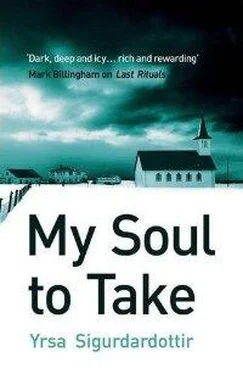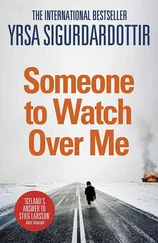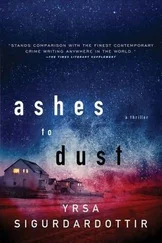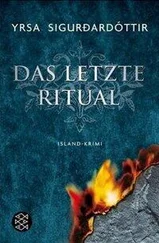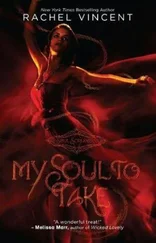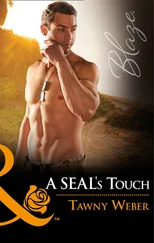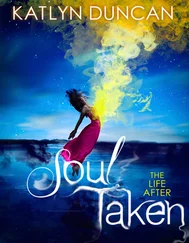“The bones I saw first weren’t from an animal,” Thóra said firmly. “Before the heap collapsed, the flashlight lit up a little woolen mitten. A bone was sticking out below the cuff, so I can only assume there’s a dead child in there somewhere. There couldn’t be anything except a hand inside the mitten. It was protruding from the stack before it collapsed, so it presumably won’t be found until all the bones have been removed. In your shoes, I’d tell the men to proceed with caution because underneath there’s a—” She couldn’t finish the sentence.
“As you may have noticed, this is a slow job,” Thórólfur said, gesturing at the men and women working around him. “We follow all the procedures governing the investigation of a crime scene, whether we find human bones or not. We need to establish what happened, because it’s hardly normal to bury half-burned carcasses like this. So don’t worry about us destroying any evidence. You’d do better to keep worrying about Jónas, because this has no bearing on the issue of his guilt.”
“Not even if I told you that under all this lies the skeleton of the illegitimate child of Magnús Baldvinsson, from World War Two?”
“I don’t see why that would make any difference,” said Thórólfur offhandedly, although his interest was clearly aroused. “Or perhaps you mean that he murdered his own child, then slaughtered dozens of animals and threw their bones over the body?” He smirked. “And then came back, sixty years later, to pick up where he left off?”
“It’s up to you what you deduce from all this, but paternity will be provable because a DNA sample must be taken from the child’s remains. Even though it won’t prove who killed her, the paternity test is bound to raise questions and I don’t think Magnús Baldvinsson will come out of it smelling of roses.”
“So you’re back to your theory that Magnús or Baldvin killed both Birna and Eiríkur?” Thórólfur asked.
Thóra picked more debris from her hair. “Not really. Like I told you on the phone I was beginning to think that it could be either Bergur or his wife with a male accomplice,” she said. “Matthew and I saw the wife leave the hotel with a waiter who works here. They seemed very close,” said Thóra. “It occurred to us that Rósa might have seduced him and got him to kill Birna. She could have done that in revenge for the affair with her husband.”
Thórólfur’s eyebrows rose so high they disappeared into his hair. “You’ve met Bergur’s wife,” he said. “Does she seem a likely seductress?”
“No, actually, she doesn’t,” admitted Thóra, “but beauty is in the eye of the beholder, so you never know.”
Thórólfur grinned maliciously. “Does this waiter’s name happen to be Jökull Gudmundsson?” he asked.
“Yes,” Thóra said. “I’m not sure about his second name, but his first name is certainly Jökull. Did you know they were an item?”
“They’re brother and sister,” he said. “That presumably explains how ‘close’ they seemed when you saw them.”
Thóra said nothing. Now she understood Jökull’s antipathy toward Birna; his brother-in-law had been having an affair with her. It also explained his reaction to her question about Steini. His father had caused the accident, so he was bound to be as touchy about discussing it as his sister was. “Ah,” she said finally. “That changes things slightly.”
“Yes, doesn’t it?” replied Thórólfur. “But there’s no harm in telling you that we’re still investigating Bergur’s possible involvement,” he added mildly, giving her no hint as to whether he was a suspect along with Jónas. “I can also tell you that his rifle is being cross-matched with the shell found in the fox’s carcass. We don’t have the facilities in Iceland, so it was sent abroad. Unfortunately, it takes a few days to get the results from there, but in the meantime we’ve got a few things to look into.” The police inspector took his leave of her, and headed down to the basement to see what progress was being made.
Thóra went over to Matthew, who was reaching the end of his statement to the police. This had taken a considerable time because the officer insisted on using an interpreter.
“Do you reckon we’re off to join Jónas in prison?” Matthew said, grinning, as they walked away. “The way I look right now I’d fit right in there,” he added. His clothes were covered in dust and earth, since he hadn’t had time to change since the bones had fallen on them.
Thóra looked him up and down, amused. “How long is it since you’ve got this dirty?” she asked, removing what turned out to be a fragment of bone from his sweater.
“Ages,” he replied. “We don’t break down many walls at the bank, and I’ve never encountered a heap of bones the size of that one downstairs.”
Thóra shuddered. She told him about the connection between Rósa and Jökull—hardly the Bonnie and Clyde they’d imagined. “You know,” she said, “I bet the person who put up that inscribed rock out here knew what was underneath it. It must have been intended as a kind of gravestone. A secret memorial.”
“Which presumably means the child didn’t die a natural death. Otherwise why would it be disguised?” said Matthew, as they arrived at Thóra’s room. “Besides, no one in their right mind would put a dead child in a place like that unless they had something to hide.”
“I think Magnús laid that gravestone,” she replied, opening the door. She went straight over to the telephone on the bedside table. “I’m going to call Elín and ask if she knows anything about it. Maybe she and her brother remember when it was put up, and by whom.”
“Do you think she’ll want to talk to you?” he asked.
“I doubt she’ll slam the phone down on me this time,” she said. “Not when I tell her the skeleton of a child has been found on land where her grandfather and his brother lived, and which has been owned by the family for decades.” She looked up Elín’s number. “And I’ll trick her by using the hotel telephone in case she happens to recognize my mobile number.” She turned back to the telephone. “Hello, this is Thóra Gudmundsdóttir,” she said when it was answered.
“What do you want?” snapped Elín peevishly. Thóra could hear that she was in a car.
“Firstly, I wanted to let you know that a huge stack of bones has just been found at the farm.”
“And what business is that of mine?” cried Elín. “It’s the same old story. There seem to have been dozens of bodies found in the area since Jónas bought the land. I heard on the radio this morning that he was taken into custody.”
“Yes, that’s right,” said Thóra, trying to conceal her annoyance that the media had got hold of Jónas’s case. “However, these bones have nothing to do with him, as they were probably there long before he acquired the property. If memory serves, your family built the current farm buildings, and have always owned them. Isn’t that right? I’m afraid this could be far worse for you and your brother than for Jónas. Most of the bones are from animals, but in all probability a child’s skeleton will also come to light.”
“What?” Elín exclaimed shrilly. “A child’s skeleton?” She seemed genuinely shocked and confused. “What child?”
“We don’t know yet,” said Thóra. “The police will be speaking to you very soon, so it’s probably best I don’t tell you too much. I just wanted to ask you one thing.” She paused, but Elín said nothing, so she continued. “Behind the house, on the eastern side, is a large rock carved with a verse that I think comes from a folktale. Someone must have put it there, because it’s not a work of nature. Do you know anything about this rock, or do you know who put it there?”
Читать дальше
